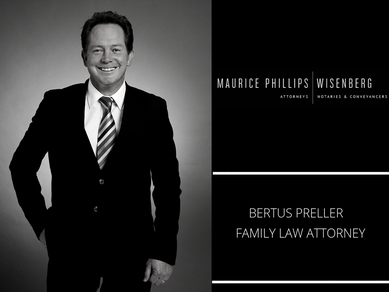|
A K v J K (19890/2018) [2020] ZAWCHC 143 (3 November 2020)
Court: Western Cape Division, Cape Town Case No: 19890/2018 Dates heard: 13 June, 2 August, 12 December 2019, 12 March & 24 July 2020 Delivered: 3 November 2020 Judge: Gamble, J HEAD NOTE Doctor who told his ex-wife he was no longer willing to fund you lying on your couch every day faces two years behind bars if he doesn’t pay her R1.5m of spousal maintenance within a month. Contempt of court – where the wife was awarded lifelong maintenance, the husband unilaterally opted to decrease paying same – The court found that he had acted willfully and with mala fides SUMMARY In this case, the parties were divorced by way of a deed of settlement on 19 September 2013. The order incorporated spousal maintenance of R52 000 per month up until the wife (applicant) dies, remarries, or cohabits with another man for more than six months. The settlement agreement incorporated an escalation clause, and by the time the matter went to court, the monthly maintenance was R69 384,48. The husband (respondent) unilaterally made the decision to start decreasing the amount of maintenance. By May 2020, he was paying R10 000 per month and was owing R1 539 158,96. As a result, the wife lodged an application for contempt of court. The court found that the wife was still alive, had not remarried, nor was she cohabiting with anyone else. The respondent was a specialist ophthalmologist. He managed a practice called Dr. J.A.K and operated various other private companies. On 12 March 2020, counsel for the respondent provided an expert report prepared in 2011 during the divorce. Experts from both sides concurred that the respondent's assets, and his ability to pay maintenance, were to be determined in line with the entities that he controlled. It was difficult to ascertain the respondent's financial position due to the fact that he did not furnish all the necessary documents, and the experts from both sides did not have a meeting. The virtual hearing of 24 July 2020. Counsel for the respondent contended that aside from the fact that the respondent's gross annual income was R13 to R14 million, he had fallen into hard times, and the applicant had to carry some of the consequences. But counsel for the appellant quickly reminded the court that the respondent had still not given full disclosure about his finances. The court noted that it was common cause that there was a court order, which the respondent knew about but still failed to comply. Consequently, the only matter was whether the breach was willful and mala fide. (See Fakie No v CCll Systems (Pty) Ltd 2006 (4) SA 326 (SCA) and Bannatyne v Bannatyne 2003 (2) SA 363 (CC) regarding the requirements for contempt of court). In Maujean t/a Audio Video Agencies v Standard bank Ltd 1994 (3) SA 801 (C) at 803H – l, the court described willfulness in the context of default judgment as follows "…deliberateness in the sense of knowledge of the action and the consequences.." The court found that such an approach was warranted in considering the willfulness element as it accords with the court's reasoning in Fakie. It was argued that the respondent only realised in February 2018 that his finances were weakening so much that he could not afford to pay maintenance. The court contradicted the argument because the respondent had always threatened to stop paying maintenance way before that point. Besides, there was uncontested expert evidence which revealed that he was still able to afford the payments. The court also pointed out that even though the respondent's accountant expressed some reservations about the deed of settlement, the respondent did sign it and continued to pay the money every month for four years without defaulting. The court found that the respondent's true motivation for stopping to pay maintenance was documented in a WhatsApp text to his ex-wife. He told her that he no longer felt like working to support her and that he was contemplating retiring in 2021. He also informed her that she must move on with her life as he did not intend to maintain her forever. The court also held that it was obvious in the respondent's answering affidavit that he knew that he could not unilaterally decide to disobey a court order. Yet, he proceeded to do so. It was further held that not only did he behave willfully, but he was also shown to be mala fide. For example, he undertook to provide the court with full details of his financial position and never did. In summary, it was held that he had failed to adduce evidence, which demonstrates a reasonable doubt that he acted without willfulness and mala fides. Consequently, it was held that the respondent should pay the outstanding R1 539 158,96 to the applicant within one month and to continue paying the monthly maintenance. He was sentenced to 60 days imprisonment, which was suspended for two years on the condition that he complies with the court order. The Evolution of Divorce and Family Lawyers
Contemporary family law practice requires that the family lawyer’s philosophical map be redrawn so that she sees herself first and foremost as a conflict manager and problem solver. - Action Committee on Access to Justice in Civil and Family Matters (The “Cromwell Report”) Most critics of our present adversarial family law system focus on the overly aggressive family law attorney who uses sharp tactics and hostile methods of representation, thereby exacerbating an already complex situation. They recommend that we should somehow find a way to reign in these rogue family law gladiators. In a recent case in Australia a woman received up to five letters a day – including on weekends – from her ex-husband’s lawyer. The letters were often times angry, allegedly threatening and, according to a presiding judge, inflammatory and accusatory. Regardless, the woman had to pay for her lawyers to read and respond to every letter. By the time the property and custody aspects of the bitter court dispute were settled, she and her ex-husband had amassed more than $860,000 in legal fees. As well as the repeated letter-writing, the case also involved several court applications – all of which cost to launch and respond to. It amounted to a kind of financial abuse, and one that was able to occur in the current court system. After the case the woman remarked: “As the family court system falls apart, all of the unethical, unscrupulous, bottom-feeding lawyers converge to extract money from the carnage”. In his judgment the presiding judge noted the large volume of correspondence between lawyers that were attached to the affidavits, including some within the 500 pages of exhibits to the father’s affidavit. “Some of those letters were inflammatory and reflected the anger of the parties or one or other of them,” he said. “The letters were at times accusatory. They were often verbose and at times involved unnecessary tit-for-tat commentary. Some of the letters served little or no forensic purposes. “Solicitors are not employed to act as ‘postman’ to vent the anger and vitriol of their clients.” The judge went on further to say. The judge remarked, "Whether this win at all costs, concede little or nothing, chase every rabbit down every hole and hang the consequences approach to family law litigation is a reflection of a Sydney-based culture by some or many litigants or whether it is an approach by some legal practitioners or a combination of both, I do not know. Whichever is the cause, the consequences of obscenely high legal costs are destructive of the emotional, social and financial well being of the parties and their children. It must stop". The judge stated that legal practitioners – who were often representing people for their first interaction with the family court – had a duty to minimise costs and reduce conflict. “The children of these parties depend upon the income and assets of their parents to support them,” he said. “Yet, in this case, the costs of the proceedings have taken a terrible toll on the wealth of the parties and consequently their ability to support and provide for their children.” “A formalist reading of the law says the law is about the best interests of the children. But what are the best interests of the children? That’s culturally determined. And it’s determined by the lawyers and barristers and theater performance on the day.” I personally know of one matter where a family law attorney advised a client to obtain a protection order against her husband since the husband abused her emotionally and verbally. The client informed the lawyer that the husband said to her that if she obtains a protection order against him that he will commit suicide. The lawyer brushed this off as another attempt of abuse and proceeded with obtaining the protection order. The result, the husband committed suicide. As life changes, people do too, the same goes for lawyers. Lawyers are well-known for resisting to adapt to change. What lawyers don’t realise is that the law does not exist for the purpose of keeping lawyers employed. We live in an era where the general public have become smarter, information is freely available, and people become negative towards lawyers. Lawyers are perceived to make money on hours billed, the longer a case stretches, the more fees in the pocket. The problem is the mindsets of the archaic old school breed of lawyers. The ones who have been molded by an adversarial, combative and confrontational legal system, where the law is seen as a battle of winners and losers. Family law issues themselves are emotional and value laden, adding additional complexity for the role of the lawyer. Over-identification with clients may be challenging in many areas of law, however the personal nature of family law creates a difficult task for separating the client’s problems from the lawyer’s personal history. Family law comprises of personal and intimate matters and the most vulnerable members of our society – children. The issues can lead clients and lawyers to feel passionately, especially when we have our own histories. Nevertheless, clients will not be well served if lawyers cannot work together on effective and proportionate dispute resolution and solutions to the issues. We must isolate clients’ views from those of lawyers and recognize that, as lawyers, we only fully have one side of the story. What is more, clients will not be well served by personal incivility in contentious matters. After all, if lawyers are not civil to each other on a personal level, how can we expect spouses taking part in a family breakup, the most aggravating time of their lives, to do so? Family law consists of a unique crossroad of emotional, financial and legal challenges. It entails of rights presented by the law – compensation for sacrifices made for the family unit, entitlement to benefit from the increase in net family wealth, and financial support for the ongoing care of children. It furthermore deals with rights that are people-oriented, rather than act-oriented, such as care and contact. Family law demands the resolution of financial issues, that are usually tied to emotional issues. Emotional information is essential - information that may potentially be at the root of the relationship breakdown, regarding whether a spouse committed adultery, or lied about their sexual orientation. Emotional information is not really legally relevant since the introduction of no-fault divorce, nonetheless it is pertinent to a client making decisions in an interest-based process. Family law is changing towards non-adversarial dispute resolution processes. As a consequence, some family lawyers are representing clients who are attempting to reach settlements that recognize their interests, instead of just pursuing their legal rights. By reacting to the full spectrum of client needs, lawyers are expected to act in a different way than they do whenever they are representing a client in a traditional civil litigation matter. They give consideration to the emotional and financial consequences of relationship breakdown – issues that are not usually within the purview of the family law lawyer. They objectively reality check with their clients, and they approach interest-based negotiations in a client-centric way. These lawyers view their role as that of a non-adversarial advocate, and their clients as whole people with interests that are not just legal. Most civil litigation disputes are linear: there is an incident, a claim, and a resolution, then the parties go their separate ways. In family law, the parties may remain interconnected if they have children; which means, they will remain in each other’s lives, at the very least participating in family functions. If there are maintenance responsibilities, they may be financially attached for an indefinite duration. Family law comprises of reviews and variations, meaning the parties may review issues when there is a change in circumstances. In other words, family law issues are not always linear and do not always allow for a clean break. Clients will need to communicate over time. The vast majority of family law legislation and jurisprudence is centered on the care of children, and the economic consequences of the dissolution of the family unit, legal rights that are designed for an adversarial system. The way families deal with disputes has significantly changed over the last decade. Scholars have focused on a number of substantive law changes that have contributed to this transformation. These include the changing definitions of marriage, parenthood, and families. However, less focus has been paid to the huge changes that have taken place in the processes surrounding family dispute resolution. Social science research over the last two decades has made a powerful case that children's well-being following parental breakup is dependent upon their parents' conduct throughout and after the separation process. A great deal of the research indicates that the greater the levels of parental conflict to which children are exposed, the more negative the effects of family dissolution. As two leading reformers recently stated, "in the last quarter century, the process of resolving legal family disputes has, both literally and metaphorically, moved from confrontation toward collaboration and from the courtroom to the conference room". The standard adversary system has failed many family law litigants, especially in contested cases concerning children. As family court proponents have accurately observed, existing legal standards make family court proceedings mainly a backward-looking process, fashioned to assign blame and, as a result, add to the acrimony between parents. However, possibly just as problematic, those same indeterminate standards make it difficult for parties to anticipate results in court, and reduce the likelihood of achieving early and less costly agreements concerning childcare and contact related issues. Even if agreements are ultimately reached in most cases, parties spend enormous resources on lawyers, investigators, and other experts to show the other parent unfit. We should now acknowledge the contaminating and toxic nature of the whole adversarial court-supervised divorce and care and contact process and start to move divorce completely outside of the court’s grasp. This can only happen if there is a mind shift in the minds of Family lawyers. In Australia the law reform commission launched its review into the Australian family court system by focusing on areas of key concern for families. These include ensuring the family law system prioritises the best interests of children, best addresses family violence and child abuse, and supports families, including those with complex needs, to resolve their family law disputes quickly and safely while minimising the financial burden. Some of the key recommendations were that family violence must be determined early in the proceedings. This ensures the right orders are made to protect children and too often that is not happening. In an article in the Economist it was reported that all around the world, lawyers generate more hostility than the members of any other profession—with the possible exception of journalism. South African divorce law is founded on the adversarial system where two lawyers represent their clients’ positions before a judge or magistrate, in contested divorce cases, who then try to determine the truth of the case. Some authors trace the process to the medieval age-old mode of trial by combat, a system that forces the parties into a mind-set of winners and losers. Let’s face it, we live in an adversarial society, one that approves the idea that every time there is a conflict sides must be taken. That means that one side ending up on top, the other side ending up on the bottom, a looser and a winner. The adversarial system is a poor way to solve divorce. This is especially true where children are involved, the adversarial system is sluggish, and many people are refused justice for too long simply because the system tends to lengthen the trial process. “Justice delayed is justice denied”. This system is additionally expensive and requires litigants to have legal representation. The high cost of legal advice and legal representation impede those who cannot afford it. This may suggest that vital evidence which needs to be drawn out by questioning may not be presented in the trial and as such, the truth may not always surface. The cost of divorce can differ significantly starting almost free to nearly all a couple’s assets. On one end of the spectrum, spouses can draft their own divorce settlement agreement, have a lawyer review it, and spend only the essential court filing and court appearance fees. At the other end, animosity can get the better of otherwise reasonable people, and when they become embroiled in drawn-out and costly litigation, they end up wasting many thousands of rands on attorney's fees and costs. Someone who is having a contested divorce case is advised to employ experienced attorneys. Some of the principal issues that affect divorce cases entail childcare and contact, maintenance and the division of property. Separating Your Emotions from Your Divorce Case The costliest blunder some couples make is utilizing the divorce case as a way to show which partner was “the better spouse” during the course of the marriage. If you're arguing over property division or child contact out of anger at your spouse, instead than thinking about what's fair or best for the children, you will rapidly run up bills from senseless litigation. How Does Acrimony Increase the Cost of a Divorce? Animosity and pointless litigation can bring many additional costs to a divorce. Divorce cost is also determined by the wealth of the couple; when wealthier individuals can't agree on maintenance or property division, they tend to employ more expensive lawyers and are also more probably to need financial experts such as forensic accountants, psychologists, and property appraisers. Acrimonious custody disputes and battles over the division of assets can also enhance divorce costs. Custody battles can quickly become the most expensive part of your divorce. For parents who spend nearly every night at home with his or her children, the possibility of only seeing their children every other weekend can be dreadful. Although many couples agree that one parent ought to be the primary caretaker of the children, other people fight tooth and nail to be the primary parent. Many costs come from dealing with a care and contact dispute as a contest to optimize your custodial time and limit your spouse’s. To decrease unnecessary costs in a custody battle, parents should rather start from the standpoint that the child is best off having adequate time with each parent, and try to truly find a contact schedule that promotes a positive relationship between each child and each parent rather than employing forensic child experts to recommend at great cost what the contact should be. Division of Property and Divorce Expenses Divorcing couples must decide how to divide their asset and debts, an exceedingly sensitive topic for spouses who have probably argued over money before to divorcing. Countless unnecessary costs come from spouses’ unrealistic expectations regarding what their financial life will look like following divorce. With the exclusion of very rich couples, most spouses must expect that moving from one household to two households will fundamentally mean some decrease in their standard of living. When making use of attorneys, every day that couples fight over money means that there will be less money to divide at the end of the divorce process. If you're anticipating an extremely ill-proportioned division of assets in your favour, you're likely to be dissatisfied, unless of course you have a really compelling legal argument for an unequal split of real estate and personal property. If you are proceeding with unrealistic expectations, you'll likely lengthen your litigation and run up the cost of your divorce, just to find at the end of the day, the division will be something near to 50/50 (if you married in community property). Trial and Divorce Expenses Whether your divorce case ultimately settles or goes to trial can make a tremendous difference in your ultimate legal costs. Between the legal preparation necessary and the trial, itself, heading out to trial can definitely double ones litigation costs. One must only go to trial after having attempted to negotiate a settlement agreement in good faith and having attended mediation. Many divorcing spouses aren’t able to negotiate a complete divorce settlement on their own, and attorneys are usually necessary. Divorce attorneys are indispensable when one spouse is furious, dishonest, revengeful, or even just more financially intelligent than the other. As the best interests of the child is paramount, it is mandatory that due regard and due consideration be given to any views and wishes expressed by the child. The Court sits as upper guardian in the protection of the best interests of the minor child. Read more about two cases that where the voice of the child was taken into consideration by the court.
RM v BM 2017 (2) SA 538 (ECG)
In this case for divorce, the plaintiff wife put in issue the validity of the antenuptial contract. Its clauses one and two excluded community of property, and of profit and loss; clause three made the marriage subject to accrual; clause four listed inter alia the assets comprising the husband's estate for calculating accrual; and clause five appeared to exclude those assets from his estate. The court ruled that clauses four and five were irreconcilably contradictory, and rendered D the antenuptial contract void for vagueness. Ordered, that the contract was void, and the parties were married in community of property.  The respondent married Mr “A” on 19 July 1997, and a child was born of the marriage on 2 June 2009. On 26 November 2013, the respondent and the child left Australia with the consent of Mr “A” to visit the respondent’s ailing father in South Africa. The respondent was due to go back to Australia with the child on 7 January 2014. Nevertheless, on being informed by her husband that he no longer desired to be married to her, the respondent made the decision to stay in South Africa with her child. Mr “A” then authorised the Central Authority of Australia to request the applicant (the Central Authority for the Republic of South Africa) to initiate the present proceedings. The applicant applied for an order against the respondent, for the return of her child to Australia. The order sought is in terms of Article 12 of the Hague Convention on the Civil Aspects of International Child Abduction, 1980. The respondent raised both defenses permitted in article 13. In terms of 13(a) of the Convention she contended that her husband had consented or acquiesced expressly, alternatively tacitly to her removing and keeping the child in South Africa. In terms of 13(b), she stated that it would be a grave risk to expose the child to physical and psychological harm or place her in an excruciating situation if the order were to be granted for her return to Australia. Held that the aim of the Convention is to protect children internationally from the damaging effects of their unlawful removal or retention and to guarantee their quick return to the state of their habitual residence out of deference for the integrity of the laws of that state. It is also premised on the concept that the best interest of the child is to be returned to their habitual residence. It is then up to the authority in the state of habitual residence to decide access and custody. Article 12 provides for the application to be brought not more than a year after the child has been removed from its habitual residence. If it is brought more than a year later the judicial authority may not order the return of the child if it is shown that the child is settled in its new environment. The rationale underpinning this provision is that it would be disruptive to return a child who has settled in its residence. In this case, the child had now lived in South Africa for more than a year. Consequently she had settled well at school and in the home she shared with the respondent and her parents. A social worker engaged to report on her circumstances and the curator who represented her in the proceedings confirmed that she was well adjusted to her life in South Africa. Although that was dispositive of the matter, the Court also considered the respondent’s defences, and found them to have merit. The application was dismissed.  Liability of divorced or separated parents for fees at fee-paying public school The South African Schools Act 84 of 1996 (the Act) provides that a parent is liable to pay school fees at fee-paying public schools unless or to the extent that he or she has been exempted from payment. One of the requirements for exemption from payment of fees is that the applicant must provide the ‘combined annual gross income of parents’. In MS v Head of Department, Western Cape Education Department and Others 2017 (4) SA 465 (WCC); [2016] 4 All SA 578 (WCC) the applicant MS, a divorced mother of the learner at a fee-paying public school, was refused exemption by the school governing body (SGB) of the local school as her application was incomplete in that it did not include the financial position of her former husband that she had since divorced. He was very uncooperative and did not provide his financial position. The first respondent, the Head of the Department of Education in the Western Cape, rejected the applicant’s appeal against the decision of the SGB. Contending that her liability to pay school fees was joint rather than joint and several, the applicant approached the court for an order reviewing and setting aside the first respondent’s decision regarding her appeal. In other words, her stance was that her application for exemption from payment of fees should be determined on the basis of her financial position alone concerning her share of liability for fees. That meant that for the balance the SGB would have to deal with her divorced husband separately. Le Grange J granted with costs an order reviewing and setting aside the decision of the first respondent. The matter was remitted to the first respondent for determination of the exemption as the court itself was not a better place to do so. Moreover, doing so would encroach on the doctrine of separation of power between the judiciary and the executive. It was held that on a proper construction of the provisions of s 40(1) of the Act, liability of a parent to pay school fees had to be regarded as joint and not joint and several. That was reference to the liability of the parent to the school in terms of s 40(1), not the liability for school fees between parents, which could be affected by private arrangement, as was the case in the present matter. Given that back in 2010 both parents undertook to remain involved in all aspects of the learner’s life, including her schooling and general welfare, the suggestion by the applicant that she was offended by the respondents to regard the divorced husband as part of her family and to insist that she requested financial information from him in order to complete the application forms for the school fees was unjustified. In fact, she accepted and agreed that she was under a legal obligation to forward correspondence relating to the learner to the divorced husband. Moreover, both parents accepted to remain co-holders of parental responsibilities and rights in terms of the Children’s Act 38 of 2005. Therefore, the relief sought by the applicant for a declaration to the effect that by requesting her to also submit financial information of her divorced husband, the SGB infringed her right to human dignity by degrading and humiliating her, as alleged, was unsustainable and legally untenable.  The welfare of children in a divorce or separation is the most important aspect of any divorce. Although most couples believe children’s welfare is one of the most important factors to consider in a divorce, a great percentage of parents that divorce or separate see conflict as an inevitable part of the process and are determined to fight battles in court. From time to time one comes across an intransigent parent who is incapable of objectivity when considering what is best for the child. It may well be that you do not like your partner, but the child’s view of the parent is different. He or she will have love and trust for that person, capable of transcending even the most dreadful scenes that may have been witnessed. Unfortunately it occurs often that one parent use the machinery of the law in a wrongful manner in an attempt to “legally abduct” or alienate a child by making false allegations against or about the other parent. Often one would find that a parent will for example falsely accuse the other parent of sexually molesting the child or accusing the other parent of emotional abuse towards the child. In a recent matter a mother who was the custodian parent brought an application for a protection order against the father on behalf of their 8 year old daughter because according to her the father abused the child emotionally, when the father in fact only disciplined the child. The father was trying to make telephonic contact with his daughter for days but the mother frustrated the contact by not answering the phone and replying to his sms messages. When the father eventually did manage to speak to his daughter he disciplined her over the phone for not contacting him. The child burst out in tears and the mother used the incident as the basis for a protection order against the father for alleged emotional abuse of the child. The court granted an interim protection order in the father’s absence and the father was only able to see his child under supervision, previously the father had contact with his child every alternate weekend. A social worker was then appointed as well as a psychologist to investigate. Needless to say the child was dragged through court appearances at the Children’s court. A child prevented from seeing a parent, they still love will eventually turn the resentment against the one trying to enforce the unenforceable. Parents often fail to comprehend the impact on the children of the conflict in their relationship. The adults in the child’s life, can make the divorce and separation experience for a child much less harmful by being aware of several ways to help the child: The child must feel and experience unconditional love from each parent. The child must feel free of fault for the divorce and separation. The child must feel that each parent respects the rights of the other parent. The child must feel that he/she will be okay after the divorce and separation. The child must feel that each parent will be okay after the divorce and separation. Children sense and feel their parent’s emotions and especially the parent’s emotions toward one another. During a divorce and separation, adults experience some very strong and difficult emotions. It is difficult for a human being to understand how he/she could have so much love and passion for another person at one point in time, and then later have so much disdain and even hatred for that same person. It is okay for parents to talk to the child about the fact that they don’t love each other any more but the child must hear, sense, and feel that while the parents don’t love each other any more and don’t want to live in the same house, they do respect each other’s rights as a parent to the child. For example, both parents should encourage the child to spend time with the other parent, to respect to the other parent, to obey the other parent, and to love the other parent. This can be very difficult when a parent thinks the other is making poor decisions. The goal for divorced or separated parents should always be to maintain the best co-parenting relationships possible by moving past previous relationship issues and focusing on children’s well-beings. Conflict within a relationship or marriage where there are children involved or after a divorce or separation is the most harmful thing parents can do for their children’s development. If children go through their parents’ divorce, they have lost some access to both their parents to an extent. If the parental combat continues, the children have not only lost that access, they are still involved in that conflict and it harms children. Focusing on the children instead of the relationship problems can help divorced couples to be better parents, not messed up parents. Bertus Preller Family Law Attorney Bertus Preller & Associates Inc. 021 422 2461 Source: http://voices.news24.com/bertus-preller/2013/03/if-you-do-mess-up-your-marriage-or-relationship-please-dont-mess-up-your-children-in-the-process/  Is there a duty on children to support their parents? Children have a responsibility to support their parents and grandparents, but always subject to the rule that support must be claimed from closer relatives first. The basis of a child’s duty to support parents is the sense of dutifulness or filial piety. In certain circumstances, even a minor child may have to support parents. As always, the criteria of need on the part of the person to be maintained and ability to support on the part of the person from whom support is claimed, must be present. A parent who claims support from a child must prove his need and the child’s ability to support but a more stringent criterion of need is applied to parents than to children – indigence on the part of the parent is stated to be a condition. In the case of Smith v Mutual and Federal Co Ltd 1998 4 SA 626 (C) the court emphasized that, to prove need, a stringent criterion of need must be established. For the claimants to succeed, they are required to prove not only that the deceased had provided support, but also their own indigence and inability to support themselves. Indigence is defined as extreme need or lack of the basic necessities of life. In Oosthuizen v Stanley 1938 AD 322 328 the court referred to “the quality and condition of the persons to be supported”. In the same case, it was pointed out that where a parent must be supported it is not only his own needs but also those of his dependents that must be considered. In Van Vuuren v Sam 1972 2 SA 633 (A) 642 Rabie JA referred to the same criterion, but stressed that the support of parents must be confined to the basic needs, namely food, clothing, shelter, medicine and care in times of illness. Is there a duty on grandparents to support their grandchildren? The maintenance obligation towards a child is primarily the burden of the parents of the child. However, if the parents are not capable of meeting this obligation, it is inter alia transferred to the grandparents. In Barnes v Union and South West Africa Insurance Co Ltd the court ruled: “It seems clear that there is an order of priority under the common law. ‘If father and mother are lacking or are needy the burden of maintaining grandchildren and other further descendants has been laid by the civil law on the parental and maternal grandfather and the rest of the ascendants.” Per this text there is a priority upon whom the burden to maintain children falls if the parents cannot maintain them. The burden first falls upon the grandparents, and if they cannot pay, the burden is transferred to the great-grandparents, before brothers or sisters are called on to pay maintenance. It would seem as if the direct line must first be exhausted before the collateral line is engaged for support. Compiled by: Bertus Preller - Family Law Attorney Bertus Preller & Associates Inc. Ground Level, The Chambers, 50 Keerom Street, Cape Town, 8000 Telephone: +27 21 422-2461 or +27 21 422-2573 or +27 21 422-2597 Facsimile: +27 086 572 8373 E-mail: info(@)preller.co.za Facebook: http://www.facebook.com/divorceattorneys Twitter: @bertuspreller  It frequently happens that parties include a clause in a Divorce Settlement Agreement that neither party shall have the right, after divorce, to approach the maintenance court for a variation of the spousal maintenance. Effectively this means that the maintenance may not be increased or decreased. According to section 8 of the Divorce Act, 70 of 1979 a maintenance order, made in terms of this Act, may at any time be rescinded or varied or, in the case of a maintenance order or an order with regard to access to a child, be suspended by a court if the court finds that there is sufficient reason. The Maintenance Act 99 of 1998 (“the Act”) provides at section 6 as follows: “6 Complaints relating to maintenance (1) Whenever a complaint to the effect- … (b) that good cause exists for the substitution or discharge of a maintenance order; or … has been made and is lodged with a maintenance officer in the prescribed manner, the maintenance officer shall investigate that complaint in the prescribed manner and as provided in this Act”. The Act further provides at section 16(1) as follows: 16 Maintenance and ancillary orders (a) in the case where no maintenance order is in force-- (i) make a maintenance order against any person proved to be legally liable to maintain any other person for the payment during such period and at such times and to such person, officer, organisation or institution, or into such account at such financial institution, and in such manner, which manner may include that an arrangement be made with any financial institution for payment by way of any stop-order or similar facility at that financial institution, as may be specified in the order, of sums of money so specified, towards the maintenance of such other person, which order may include such order as the court may think fit relating to the payment of medical expenses in respect of such other person, including an order requiring such other person, if the said other person qualifies therefor, to be registered as a dependent of such person at a medical scheme of which such person is a member; …or (b) in the case where a maintenance order is in force-- (i) make a maintenance order contemplated in paragraph (a) (i) in substitution of such maintenance order; or (ii) discharge such maintenance order; or (c) make no order. In terms of section 6(1) of the Maintenance Act, a maintenance order (whether in terms of a consent agreement or not) may be varied or discharged if a complainant can demonstrate “good cause” therefore. In Odgers v De Gersigny [1] the Supreme Court of Appeal held that where parties have agreed in a consent agreement that the ex-wife shall be maintained for x amount of years and the agreement makes no mention of remarriage or death, the ex-husband will have to continue paying the maintenance if the ex-wife married before the time ran out, as a consent agreement is contractual in nature and parties will be held to their bargain. However, it should be noted that this case was concerned with the interpretation of a consent agreement and not with whether there existed “good cause” to set the consent agreement aside. In Georghiades v Janse van Rensburg [2] the court held: “Generally speaking, our courts except that circumstances must have changed substantially and that it would be unfair to allow the order to stand in its original form before rescission, variation or suspension of an existing maintenance order will be granted. In Havenga v Havenga, Harms J, pointed out that, although, in general, they will not be sufficient reason for the variation or rescission of a maintenance order in the absence of a real change in circumstances, changed circumstances are not a statutory prerequisite and they may sometimes be sufficient reason although circumstances have not changed”. The validity of a waiver of the right to apply for the rescission, variation or suspension of a maintenance order was for long controversial, the essence of the debate being whether such a waiver was contrary to public policy. Those who have argued that it was, considered the waiver to be undesirable in that it deprived the court of its jurisdiction to rescind, suspend or vary the order. Those who took the opposite view stressed freedom of contract. The cases of Knight [3] Gawith [4] Cillier [5] and Claasens [6] concerned agreements between divorcing parties in which one party only waived the right to variation.In Gawith and Claasens such waivers were found to be valid; in Cilliers the waiver was found to conflict with legislation then in force; in Knight Corbett J expressed grave doubts about the correctness of decisions in which such waivers had been held to be valid but considered himself bound by the previous decisions to that effect in his division. He nevertheless found the relevant clause to be undesirable on other grounds. As a general rule a maintenance order made in terms of the Divorce Act may at any time be rescinded, varied or suspended by a court if the court finds that there is sufficient reason to do so, see Reid v Reid.[7] The application for variation may also be to extend or shorten the period during which maintenance is payable. In Georghiades Griesel J said as follows[8]: “[13] Section 8 of the Act creates an exception to the general rule that an order of court, once pronounced, is final and immutable. It permits the Court, for 'sufficient reason', to rescind, vary or suspend a maintenance order granted earlier. This provision was introduced so as to authorise the Court to amend maintenance orders on good cause shown, so as to enable spouses to come to Court 'to redress injustices occasioned by a maintenance order which no longer fits the changed circumstances'.” The learned Judge went on to state that each case must be decided on its merits and, referring to case law, drew a distinction between cases relating to a fixed amount payable till death or remarriage and cases where maintenance was payable for a limited period. In this regard the following was stated[9]: “[26] Counsel also relied on the cases of Girdwood v Girdwood [10], Davis v Davis [11] and Hoal v Hoal [12]. Comparisons were made, inter alia, between relevant clauses of the consent papers in those matters and those of the consent paper in the present matter. In this regard it bears repetition that limited assistance can be obtained from considering the terms of agreements which featured in other cases and that each case must be decided on its own facts". In Bond v Bond [13] the court was asked to vary a consent order incorporated in the divorce decree regulating the parties' divorce, the court in the present inquiry, focused on the interpretation of one of the clauses (relating to maintenance) in the order. The respondent contended that the applicant was precluded from obtaining a variation of the consent paper. The court held that a basic principle of interpretation is that a court will always first look to the wording of the terms that had been agreed upon by the parties, and will as far as possible give the language used by the parties its ordinary grammatical meaning. The only circumstances where this situation will be deviated from, is when it leads to inconsistency, repugnancy or an outcome contrary to public policy. Once the literal meaning has been ascertained, then regard must be had to the context in which a word or phrase is used. Regard must also be had to the nature and purpose of the contract. In doing so, the common intention of the parties at the time of concluding the consent paper must be ascertained according to the above mentioned cannons of construction. In this case, the respondent undertook to maintain the applicant "until her death, remarriage or cohabitation in a relationship akin to that of marriage". That was what would constitute the "maintenance period". There was no automatic termination of the maintenance, unless one of those events occurred. In terms of section 8(1) of the Divorce Act 70 of 1979, a maintenance order may be rescinded, varied or suspended at any time if the court finds that there is sufficient reason therefore. The only limitation on the court's power to rescind or vary a maintenance order, is that "sufficient reason" must be shown. The court concluded that the applicant was entitled to apply for an increase as she had. In Girdwood, supra, the court held that in the case of waiver of a spouse’s right to claim variation of maintenance after divorce, there would have to be a clear indication in the settlement agreement that the spouse was fully aware of the statutory right to claim variation, and that he or she expressly or by his or her conduct waived that right. In the case of Barkhuizen v Napier [14] the Constitutional Court found that the proper approach to the constitutional challenges to contractual terms was to determine whether the term challenged was contrary to public policy as evidenced by the constitutional values, in particular, those found in the Bill of Rights. This approach left space for the doctrine of pacta sunt servanda to operate, but at the same time allowed courts to decline to enforce contractual terms that were in conflict with the constitutional values even though the parties might have consented to them. In the case of Schutte [15] the Supreme Court of Appeal found that a clause in a settlement agreement that prohibited the parties to approach a court to vary maintenance was not against public policy. It goes without saying that a non-variation clause may have bizarre consequences for the parties. For example, where a husband becomes unemployed or is sequestrated after a divorce his dilemma will be that he will not be able to approach the maintenance court for a reduction of his maintenance obligations. This in itself can be viewed as against public policy. It is clear that the court will always be able vary a maintenance order when there is sufficient reason to do so. Although a settlement agreement is contractual in nature it may be argued that since it is impossible to foresee the future circumstances of the parties considerations of fairness and justice should be applied. With that in mind it is submitted that in special circumstances a courts' jurisdiction should not be ousted to vary a maintenance order that simply does not fit in with reality. Settlement agreements are not agreements that are cast in stone. For example, a settlement agreement may deal with the care and contact arrangements of the children and stipulates how contact between the parents and the children should be exercised. As children grow older the essence of the contact also changes as the circumstances evolve, the same can be said of maintenance. [1] 2007 (2) SA 305 (SCA) at p309 [2] 2007 (3) SA 18 (C) at para [15] [3] 1967 1 SA 40 (C) [4] 1966 3 SA 596 (C) [5] 1977 1 SA 561 (O) [6] 1988 4 SA 163 (W) [7] Reid v Reid 1991 (1) SA 443 (E) [8] At para 13 at page 22 [9] At para 26 at pages 26 G to 27 C [10] Girdwood v Girdwood 1995 (4) SA 698 (C) at 708B [11] Davis v Davis 1993 (1) SA 621 (C) [12] 2002 (3) SA 209 (N) the court also held that if the parties do not specifically exclude their right to invoke section 8(1) of the Divorce Act 70 of 1979, either of them can seek variation of the arrangements regarding maintenance, care or contact they agreed upon in their settlement agreement [13] [2009] JOL 23915 (C) [14] 2007 (7) BCLR 691 (CC) [15] 1986 (2) All SA 70 (SCA) Compiled by: Bertus Preller - Family Law Attorney Bertus Preller & Associates Inc. Ground Level, The Chambers, 50 Keerom Street, Cape Town, 8000 Telephone: +27 21 422-2461 or +27 21 422-2573 or +27 21 422-2597 Facsimile: +27 086 572 8373 E-mail: info(@)preller.co.za Facebook: http://www.facebook.com/divorceattorneys Twitter: @bertuspreller Baloyi v Baloyi [2015] ZAGPPHC 728: In this case that concerned a divorce the main issue to be decided was the primary residence of the two minor children born from the marriage between the parties, a boy who of 6-years old and a girl of 4-years. Each party contended that it would be in the best interests of the minor children to reside with them and advanced a number of reasons in support of their contentions. Facts In this matter the court was faced with a situation where both the Father and the Mother are good, loving parents, who are able to care for their children. Whilst together the Mother was the primary caregiver. Since February 2014 the Father was caring for the children with the assistance of a nanny. Although the Father and the Mother’s relationship was very acrimonious, no serious allegations were made against each other. The Mother’s concern that the nanny was taking care of the children was not born out by the evidence. The children were at school during the day (until 13:30 and 15:30 respectively) and with the nanny during the rest of the afternoon. During the evenings the Father took care of the children. The Father also took the children to school. The Mother was a professional woman who was working and studying. The Mother’s further concern was that the children cried because they did not want to go back home to the Father. The Father on the other hand testified that at times the children did not want to visit the Mother. The court noted that experience had shown that children will often give different versions to different parents in a situation like the present. The children did not want to be separated from either parent and still indulge the hope that their parents would reconcile. The Father’s concern was that the Mother was not always exercising her contact. The Mother on the other hand testified that the Father sometimes frustrated her contact with the children. The court noted that from the evidence it was not a case of lack of interest on the Mother’s part, but that she was rather worn out by the continued conflict between her and the Father over the children. The Family Advocate’s concern was that the Mother was not frank and truthful with the children about the divorce, which may have created a false sense of comfort which in turn may have led to instability on the part of the children. The Mother’s aforesaid conduct as well as her failure to contribute towards the children’s maintenance was in the court’s view, indicative of a lack of insight on her part in what was in the children’s best interests. The Mother had furthermore chosen to concentrate on her studies and the court noted that together with any kind of employment, it could have made stiff demands oninter alia her free time. The Father had shown remarkable commitment. He had on the other hand re-arranged his life to best suit the children. He was able to spend time with the children, communicate with them and fulfil the nurturing role. Experience has shown that the companionship of children’s parents is of inestimable value to the children. The court was particularly struck by the fond manner in which the Father spoke about his daughter. The children were doing well at school. They appeared to be happy and secure. The Law The evidence revealed that both the father and the mother were loving and capable parents who were at various stages the minor children’s principal carers. The children were too young to express their own views. In P v P 2007 (5) SA 94 (SCA) at para [14] it was held that: “Determining what custody arrangement will serve the best interests of the children in any particular case involves the High Court making a value judgment based on its finding of facts in the exercise of its inherent jurisdiction as the upper guardian of minor children…” The factors set out in Section 7 of the Children’s Act, Act No. 38 of 2005, constitute a non-exhaustive check list of criteria which serve as guides relevant to the application of the best interest standard. The question of what a child’s best interests are must be determined according to the facts and particular circumstances of each case and not on generalisations such as the “tender age” doctrine or the principle of “preserving the status quo”. Undue weight should furthermore not be placed upon any one factor, but these factors, like all other relevant factors, must first of all be considered against the backdrop of the specific circumstances of each case and secondly weighted against all other relevant factors to be considered in determining what would be in the best interests of the child. The Constitutional Court in AD & DD v DW [2007] ZACC 27; (2008 (3) SA 183 (CC) held that: “To apply a pre-determined formula for the sake of certainty, irrespective of the circumstances, would in fact be contrary to the best interest of the child concerned”. In her work, “Divorce mediation and the best interest of the child” Lesbury van Zyl on p 67 makes the following remarks in respect of the principle of preserving the status quo: “Judges, being aware of children’s need for security and stability, are reluctant to move them and so cause them further distress than the family break-up has already occasioned. However, this is not always a wise policy, for it means that permanent custody is often awarded on the basis of an arrangement made when the parents were in turmoil and least able to make reasonable decisions. Here too, as with the maternal preference rule, the lawyer’s knowledge of the strong influence of the status quo may influence the advice they give their clients. Besides, if parents, who have temporary custody realise that they are in a superior bargaining position, they may try to delay proceedings, since the longer they have temporary custody the stronger their position, become.” Sweeping statements such as young children should reside with their mothers and/or contact with their fathers should be restricted to short periods of time, are untenable. Ordinary human experience tells one that the continued involvement, companionship, love and support from both father and mother after separation and divorce, enhances a child’s sense of security. In Chodree v Vally 1996 (2) SA 28 (W) at 32 F-G/H it was held that: “… love and affection from both also enhance the security and stability of a child…” The Court should further not only take a short term view of the possible unsettling effects occasioned by any change in the children’s lives, but also consider the possible long term benefits to be obtained in each specific case. Divorce inevitably occasions change in the lives of children such as adjusting to the daily absence of one parent, while living with the other and going back and forth between two different households. Each individual child also responds differently towards a divorce. In M v M 1973 (2) All ER 81 (Fam Div.) 85 it was held that: “Where the parents have separated and one has the care of the child, access by the other often result in some upset in the child. Those upsets are usually minor and superficial. They are heavily outweighed by the long term advantages to the child of keeping in touch with the parent concerned so that they do not become strangers, so that the child later in life does not resent the deprivation and turns against the parent who the child thinks, rightly or wrongly, has deprived him, and so that the deprived parent loses interest in the child and therefore does not make the material and emotional contribution to the child’s development which that parent by its companionship and otherwise would make.” There is further no doubt that over the last number of years the roles and responsibilities of parents within the family structure as well as social norms and patterns have changed. Fathers have also taken up parenting roles, and mothers have also followed careers. The norm these days is rather that of working parents who manage with the assistance of aftercare, domestic workers and family. It was held in Van Pletzen v Van Pletzen 1998 (4) SA 95 (O) at 101 B-D/E that mothering is not only a component of a woman’s being, but is also part of a man’s being, and that a father, depending on the circumstances, possesses the capacity and capability to exercise custody over a child as well as a mother. In Van Der Linde v Van Der Linde 1996 (3) SA 509 (O) at 515 it was held that the concept of mothering is indicative of a function rather than a persona. It includes the sensitive attachment which flows from the attention devoted from day to day to the child’s need of love, physical care, nutrition, comfort, peace, security, encouragement and support. In V v V 1998 (4) SA 169 (C) at p176 it was held that: “The old position where the custody of young children was invariably granted to mothers has change. As far as young children are concerned, the pendulum has swung to accommodate the possibility of a father being a suitable custodian parent to young children.” Therefore primary residence and contact were not to be given on preconceived notions, assumptions or judicial preferences but must be the result of a well-considered decision based on an individual and full investigation.  Parents who abandon their children It comes as no surprise that the deadbeat dad, the fully-grown man, who, having had his fun, abandons his responsibilities towards his children. As South African family life changes, fatherhood is shifting in important and sometimes amazing ways. Today, fathers who live with their children are taking a much more active role in caring for them and helping out around the house. The ranks of stay-at-home fathers and single fathers have grown considerably in recent decades. At the same time, more and more children are growing up without a father in the home. What one must never forget is that it is not really the parents who have rights it is the children who have the rights to have a meaningful relationship with both their parents. Parents have responsibilities to their children, these responsibilities are enshrined in law. The sad reality is that too many people flout these responsibilities and do not put their children first when a relationship ends. This means the children then become the pawns in a game to hurt the other person. Many fathers and mothers I have worked with know or have been subjected to terrible allegations of abuse and violence towards their former partners and their children all in the name of hindering them from seeing their children to hurt them. Sadly is it is always the children who lose out every time. There are many real stories about children who have been “left” with their mother after a divorce or separation. Often these fathers abandon the family and leave all the responsibilities to the mother or her new partner to care for his children. I am in such a situation. I care for two lovely children who have been abandoned by their father who they have not seen for more than 8 years with no emotional support and no maintenance, for the past 8 years I raised them as my own and I am proud that they call me dad. Research has found that serial fathers who leave their homes and go on to start a second family are the men most likely to lose contact with their children. More than 1 in 5 men in the UK who live with second families never meet their children born during earlier relationships, according to research. Less than 1 in 12 fathers in the survey said that they see their children from their first family every day and nearly one third said they do not have a close relationship with them. According to the survey, 129,000 fathers did not have any contact with their children and 300,000 did not pay any maintenance to their former families. The study underlined concerns over the impact on children in single-parent families over the lack of men in their lives. In the UK a million children live in ‘men deserts’, in families without fathers and in neighbourhoods and schools where they rarely meet an adult male. Another survey found that nearly one million men have children they do not live with, around one in 20 of all fathers. But it is not only dads who flout their responsibility towards their children since studies had shown that about the same percentage of mothers who did not live with their children paid all the child maintenance they owed as dads who didn’t. A recent research paper in the United States suggested that toddler dads are not quite as useless as the numbers and their popular image would imply. According to a study, which appeared in the Journal of Marriage and Family, in the United States it was found that many fathers who didn’t pay child support in cash, nevertheless made a substantial contribution in kind towards their children. Almost 50% of the fathers in the study who were cash-poor nonetheless tried to contribute in other ways for example by providing baby products, food and clothing and school expenses. Many people believe that a person can never lose their rights and responsibilities over a child. While a person may have parental rights and responsibilities in respect of a child, the extent of such rights and responsibilities may be altered if it is in the best interest of the child. Section 28 of the Children’s Act, 38 of 2005, provides that an application may be made for an order to terminate, extend, suspend or restrict the parental rights and responsibilities of a person. Over time, the circumstances surrounding a child can change and may result in many of the child’s interests being neglected or improperly catered for. Occasionally the circumstances have materially transformed to such an extent that a person’s right or ability to properly give effect to their parental rights and responsibilities, in a manner that is in the best interests of the child, are doubtful. It is therefore that the legislature introduced Section 28 of the Children’s Act. An application in terms of Section 28 may be launched to suspend a person rights for a period;
A Section 28 application may be launched by the following persons:
It is also significant to note that where a Section 28 application is launched by a person who has no parental rights and responsibilities, that person can also launch an application in terms of Section 23 to have rights of contact and care granted to them. When considering an application in terms of Section 28 the court must take the following into account:
As every decision affecting a child must be made in the best interests of the child, it follows that the persons having the rights and responsibilities in respect of a child must exercise them in a manner that is in the child’s best interests. If they do not, the law provides for a mechanism to prevent any potential harm or neglect to the child’s best interests, among other things in the form of a Section 28 application to have a persons’ parental rights and responsibilities terminated, suspended, extended or limited. Do not reproduce if you do not intend to be the best parent alive.  The primary issue between the parties had been whether the law of Mauritius or of South Africa governed their proprietary rights upon divorce. Put simply, the proper law of the marriage had to be determined. The parties were married to each other on 29 June 1983 in Mauritius. A month later they moved to South Africa and continued to live here until their divorce in November 2011. In about July 2006 the respondent, the wife (plaintiff in the court below) sued the appellant, the husband (defendant in the court below) for divorce in the South Gauteng High Court, Johannesburg, contending that the marriage relationship between her and the respondent had irretrievably broken down. In her particulars of claim the plaintiff alleged that at the time of her marriage to the defendant he was domiciled in Mauritius and that the proprietary consequences of the marriage ‘are governed by the law of Mauritius’, alternatively, that the parties were married to each other in Mauritius according to the laws of South Africa and that the proprietary consequences of the marriage ‘are accordingly governed by the law of South Africa’. On either basis, she alleged that during the subsistence of the marriage she had contributed to the maintenance and or increase of the husband's estate by the rendering of services and the saving of expenses, which otherwise would have been incurred. She listed the contributions she had made in cash and in kind. She claimed that it was just and equitable that her husband be directed to transfer to her such part of his assets so as to effect an equal division between the parties of their combined net asset values, alternatively, that he pay to her the monetary equivalent thereof. In a further alternative she claimed that the parties were married according to South African law in community of property. In his plea the husband pleaded that at the time of their marriage he and his wife had agreed that their matrimonial regime would be governed in terms of the provisions of Mauritian law, and in particular in terms of the provisions of the regime legal de separation de biens - separation of goods. The husband pleaded that at the time of the marriage, he and his wife had made a declaration that their marriage was to be governed by the regime legal de separation de biens which was recorded by a marriage officer. The husband pleaded further that in terms of the said regime each party retains its separate estate during the marriage and on dissolution thereof, neither party has a claim against the estate of the other party. At common law, the proprietary rights of spouses are governed, in the absence of express agreement, by the law of the husband’s domicile at the time of the marriage (lex domicilii matrimonii or the law of the matrimonial domicile) (Frankel’s Estate & another v The Master & another 1950 (1) SA 220 (A) at 241; Sperling v Sperling 1975 (3) SA 707 (A) at 716F-G; Esterhuizen v Esterhuizen 1999 (1) SA 492 (C) at 494C-D; C F Forsyth Private International Law: The Modern Roman-Dutch Law Including the Jurisdiction of the High Courts 5 ed 2012 at 295). The rationale for this rule, according to the Roman Dutch and Civilian authorities, is that the parties are assumed in the absence of any indication to the contrary, to have intended to establish their matrimonial home in the country where the husband was domiciled at the time of the marriage and to have submitted themselves to the matrimonial regime obtaining in that country. This court assessed the evidence and determined that, at the time of his marriage, the appellant had in fact been domiciled in Mauritius, and accordingly that Mauritian law governs the proprietary regime of the marriage. In analysing Mauritian law, this court held that the separation of goods regime provides that each party to a marriage retains its separate estate during the marriage, and that on dissolution thereof neither party has a claim against the estate of the other unless they have funded the acquisition of particular assets in the other party’s estate, to which they would then be entitled a share. However, as in this matter there is insufficient evidence to show that the respondent contributed to the acquisition of either of the properties of which she sought a share, she has not made out a claim to either of them. Accordingly, the appeal is upheld with costs, and the respondent’s claim for 50 per cent of the value for the properties concerned is dismissed.  In terms of the Pension Funds Act, No 24 of 1956 and the Government Employees Pension Law Amendment Act, No 21 of 1996, the pension interest is payable at the time of divorce. This is known as the 'clean-break' principle). Until recently, however, a payment governed by the Post Office Act is only payable upon termination of membership by the member in the fund (through death, retirement or resignation). In the decision of Ngewu and another v Post Office Retirement Fund and others [2013] 1 BPLR 1 (CC), the Constitutional Court had to decide when pension benefits accrue to divorced spouses where Mrs Ngewu was married to a Post Office employee who was a member of the Post Office Retirement Fund. It was common cause that Mrs Ngewu was entitled to a 50% share of her husband’s pension interest. However, under the rules of the Fund, her share would not accrue upon divorce but only when Mr Ngewu terminated his membership in the Fund. All parties agreed that the Post Office Act, No 44 of 1958 was unconstitutional in so far as it did not provide for the payment of the pension interest at the time of divorce. The Constitutional Court held that this differentiation violated the right of equality before the law and equal protection and benefit of the law. Consequently, the Constitutional Court declared s10 to 10E of the Post Office Act unconstitutional but ordered that the declaration of invalidity be suspended for eight months for the legislature to cure the defect. The defect was subsequently cured in terms of the Government Employees Pension Law Amendment Act. As a result of the judgments in the present case as well as the Wiese v Government Employees Pension Fund and Others (CCT 111/11) 2012 (6) BCLR 599 (CC) case, the assigned portion of the pension interest would be deemed to have accrued as is payable on the date of the divorce order.  The decision in MB v DB 2013 (6) SA 86 (KZD) concerned a divorce action between parties married out of community of property with the application of the accrual system. The issue was which party bore the onus of proof with regard to the nature and quantum of the assets excluded in their antenuptial contract from forming part of the accrual in the defendant’s (the husband’s) estate. The plaintiff (wife) relied on the evidence of a chartered accountant to prove the value of the husband’s estate and, therefore, of her potential share of the accrual. The husband led no evidence to demonstrate how he had dealt with the excluded assets over time, instead contending, inter alia, that:
Lopes J held that it was the husband, being the one in possession of all the facts relating to the assets reflected as excluded in the antenuptial contract, who bore the onus of proving which assets were to be excluded and why; to demonstrate what had happened to those assets, how they were converted from time to time, and what their present values were that fell to be excluded from the calculation of his net worth. The operative moment when the value of the respective estates of the parties had to be assessed was at litis contestatio, (ie, close of pleadings) not when the divorce order was made. Because the husband led no evidence to demonstrate how the excluded assets were dealt with by him from time to time, the court held that it would not be possible to determine what had happened to those excluded assets without making reasonable deductions from the discovered documents. The court reasoned that South African courts should follow the approach to evidence adopted in a number of English cases when dealing with failure by a party to discharge his or her duty to disclose financial information in divorce proceedings. In terms of the approach followed in English law, courts were entitled to draw inferences (where they can be properly made) and to take notice of inherent probabilities in deciding whether or not assets formed part of the non-discloser’s estate. The court accordingly ordered the division of the husband’s estate, the exact details of which fall outside the scope of the present discussion. The husband was ordered to pay the costs of the present action. |
Cases and Articles on Divorce Law and Family Law in the SA courts.Legal news and case law in the South African courts, compiled by Family Law attorney, Bertus Preller. Archives
October 2023
Categories
All
AuthorBertus Preller is a Family Law and Divorce Law Attorney in Cape Town. |




 RSS Feed
RSS Feed